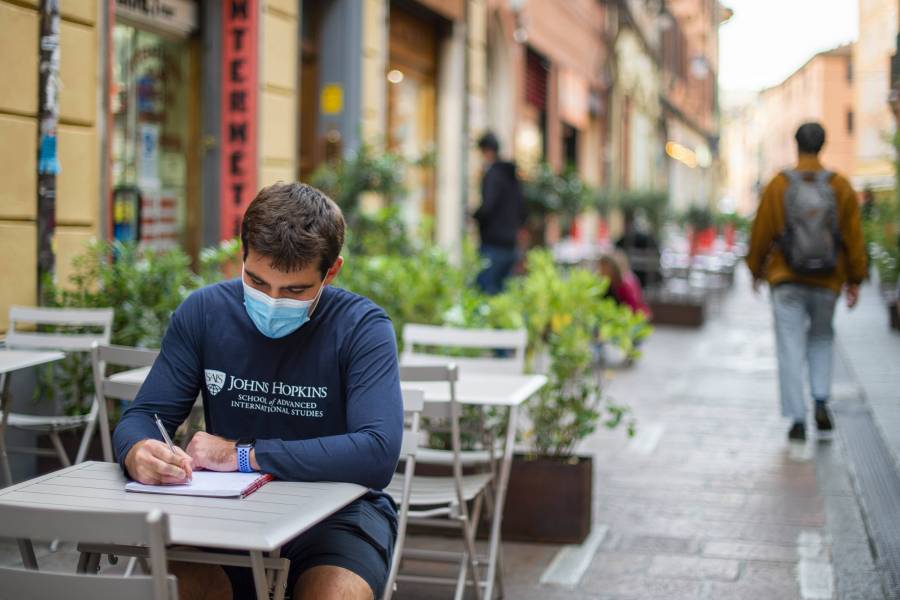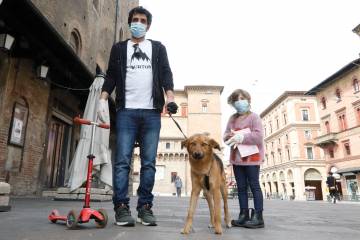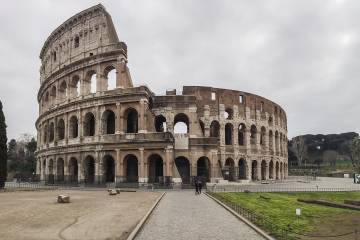As the coronavirus pandemic has forced many schools and universities around the world, including Johns Hopkins, to conduct classes remotely, one Johns Hopkins campus has opened its doors to students and faculty this fall: SAIS Europe, the School of Advanced International Studies' campus in Bologna, Italy.
One of two overseas SAIS campuses, SAIS Europe has the distinction of not only being the sole Johns Hopkins division holding in-person instruction this semester, but also hosting students from the school's Washington, D.C., and Nanjing campuses as well.
"Our students, faculty, and staff are happy to be here," says Michael Plummer, director of SAIS Europe and a professor of international economics. "We're all very grateful to have an in-person experience—and after last spring it's not one we're taking for granted."
Last spring, Italy was one of the countries hardest hit by the COVID-19 pandemic. In March, as the country locked down to limit the spread of the virus, SAIS Europe swiftly switched to online instruction for the rest of the semester.
With the pivot to remote instruction, many students returned to their home countries, with some choosing to remain in Bologna. In May, after the end of the semester, SAIS Europe worked with school and university leaders to plan for a safe reopening in the fall. Over the summer, SAIS Europe transformed the Bologna Center to reflect best health and safety practices due to COVID-19 and to upgrade its existing remote learning infrastructure to accommodate students who were unable to take classes in person.
As the fall semester approached, another issue became a greater concern for the SAIS Europe staff: securing visas for international students. Administrators worked with incoming students from around the world to help them navigate the new and uncertain visa requirements due to the coronavirus pandemic. But as the visa scenario gradually became clearer for SAIS Europe, the same was not the case for SAIS' other overseas campus, the Hopkins–Nanjing Center.
Though coronavirus infections remained relatively low in China, HNC faculty and staff soon realized that many international students—including Americans—would not be able to attain visas to enter the country. As HNC moved toward a remote fall semester, faculty and staff were conscious of a significant number of students who still wanted an in-person academic experience.
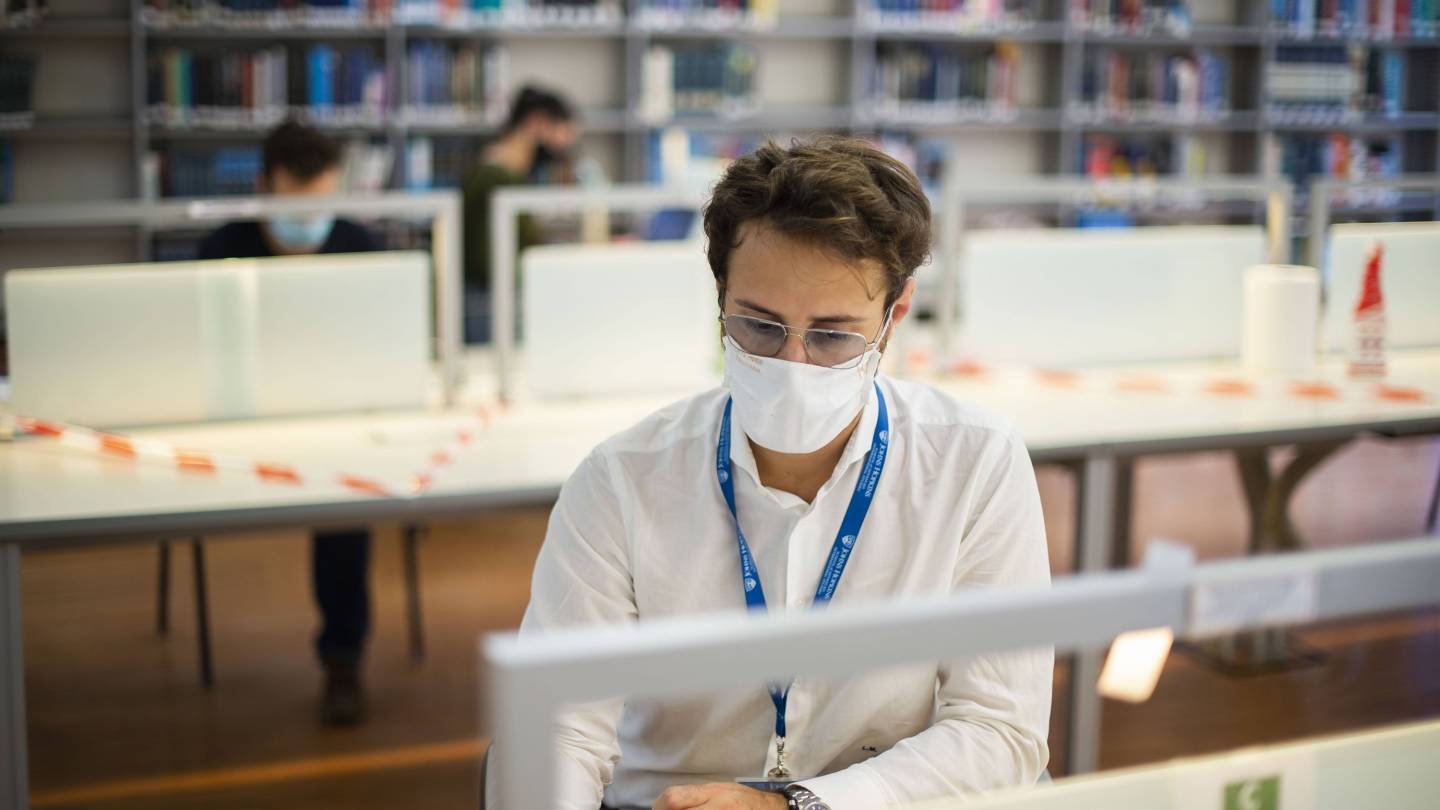
Image caption: A student works in the library at SAIS Bologna, where social distancing measures have been put in place to protect students, faculty, and staff
Image credit: Anna Fantuzzi / Johns Hopkins University
"In July, we started asking the question of whether we could be 'in exile' away from Nanjing," says Adam Webb, American co-director of the HNC and resident professor of political science. "Before COVID, we'd talked generally about fostering some type of exchange with our sister campuses in D.C. and Bologna, but once it was clear that we weren't going to open in person in Nanjing, we worked with SAIS Europe and leaders at SAIS to set a plan in motion."
In August, when SAIS Europe began its fall semester, it not only welcomed its own students but also 19 HNC students and 5 HNC faculty members, who joined "in exile" for the fall semester after quarantining for two weeks. In addition, SAIS Europe was also able to welcome 16 students who had planned to start their academic year in Washington. Students that are "in exile" take most of their classes remotely through their home campus, though they are able to make full use of the Bologna Center's resources this semester, including taking one or two courses from the SAIS Europe curriculum.
"We were planning on having a full house this fall," Plummer says. "And we certainly do have one now—just not quite how we expected."
In response to this unanticipated hybrid community, students and faculty are hoping to take advantage of the opportunity to forge new collaborations, relationships, and learning opportunities, while also maintaining health and safety measures. This semester, registration at SAIS has been expanded to allow students from HNC, SAIS Europe, or Washington to register for at least one class listed at another campus. HNC faculty are also planning to hold events in both Mandarin and English for students at the Bologna Center, some of which will also have online participation.
For SAIS, the integration at SAIS Europe this fall is emblematic of a future marked by greater collaboration and exchange among its three campuses. Plans are already underway to ensure that these continent-spanning partnerships remain in place beyond this semester.
"The coronavirus pandemic struck while SAIS was already in a time of major transformation," says SAIS Dean Eliot Cohen. "I couldn't be prouder of the way our team pulled together to unsnarl all the complications involved with having HNC and D.C. students taking classes in Bologna. Johns Hopkins is a place that really fosters this ability to make something good come out of awful circumstances. Folks here are always asking how can we use this moment to make ourselves better? This is a great example of that."
One of the HNC students "in exile" this fall is Nick Kaufman, who was previously a Fulbright grantee in the Chinese province of Anhui. When it was clear that HNC classes would be online, with a special option to temporarily join SAIS Europe in Bologna, Kaufman immediately warmed to the idea of starting his year in Italy. He was also excited by the opportunity to see China from a new, unconsidered perspective.
"At times, China studies can feel like tunnel vision, and very focused on China and the U.S.," he says. "Coming to SAIS Europe has been a great way to see how China interacts with Italy and Europe, and the way Europe interacts with China. It's a good opportunity to see China writ large, and I'm already learning a lot about how the EU relates to China. It's a unique perspective I wouldn't have received anywhere else."
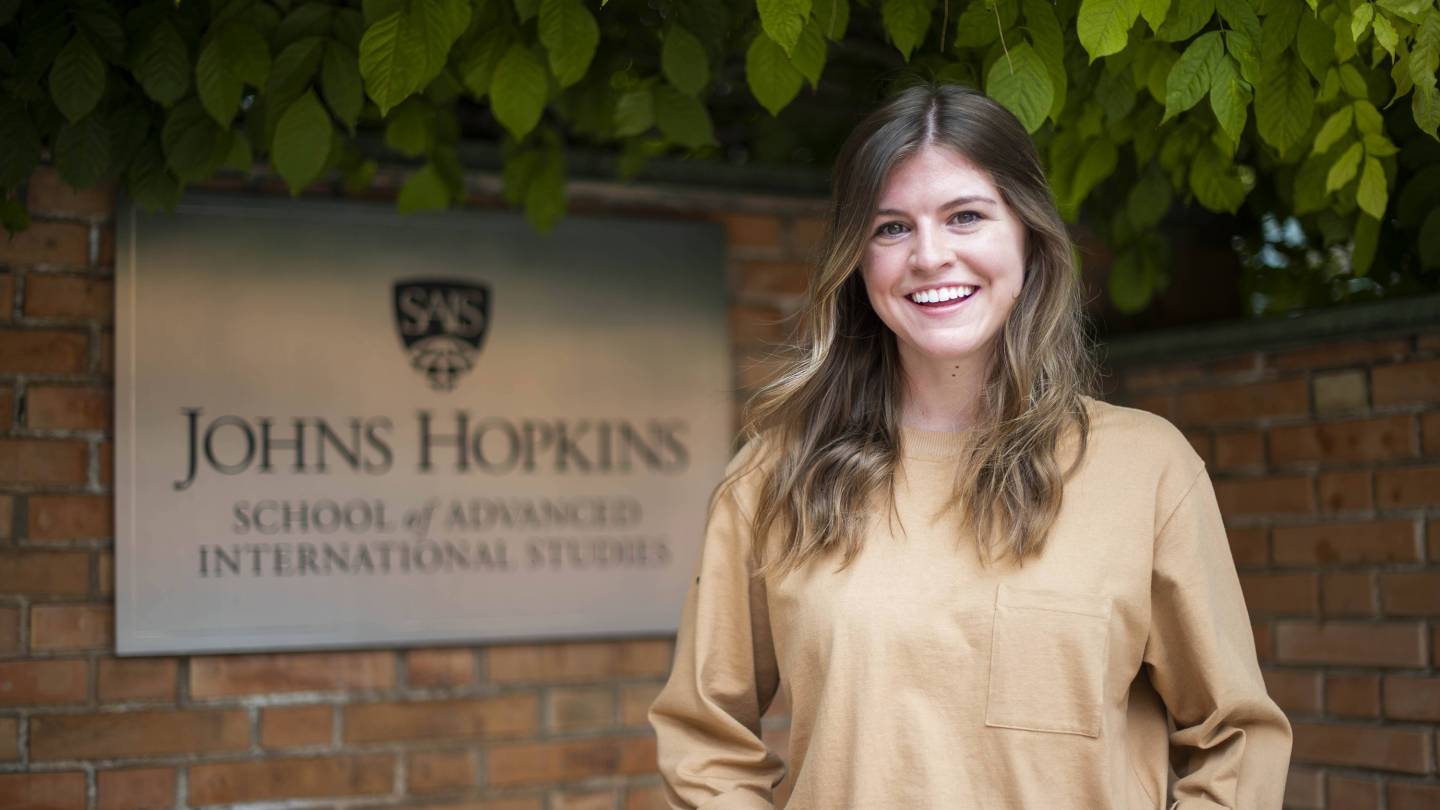
Image caption: Natalie Smith
Image credit: Anna Fantuzzi / Johns Hopkins University
Joining Kaufman at SAIS Europe is Natalie Smith, a second-year SAIS master's student who spent her first year in Bologna. After the SAIS campus in Washington turned to remote instruction in August, Smith reached out about returning to Bologna for the fall semester, adding in-person instruction at SAIS Europe to the classes she was taking remotely.
"I'm a hands-on, interactive learner, and for me so much of the draw of SAIS and SAIS Europe has been the in-person engagement—especially in my coursework," Smith says. "I wasn't sure I would get as much out of my SAIS experience from taking classes online. I'm really grateful for the way SAIS and SAIS Europe has gone above and beyond to make in-person instruction happen and also to welcome in so many HNC or D.C. students to Bologna."
While classes are in session at SAIS Europe, many of the hallmarks and traditions of past years in Bologna look radically different—from classrooms rearranged to allow for social distancing to much more limited offerings at the on-campus café. Some changes, however, represent a more permanent change, like new smartboards and cameras that have helped improve remote instruction. Despite the challenges and setbacks from the coronavirus pandemic, for SAIS, the potential for greater collaboration, both in person and online, is only just beginning.
"We are currently facing a world in extraordinary turmoil from a number of serious issues, not just the coronavirus," Cohen says. "There is—and will be—a tremendous need in every sector for the skills that our graduates possess. SAIS will be one of the institutions adapting to meet this need as we add more opportunities for students to learn in a time and mode that works for them. Even in this challenging moment, it's exciting to see this potential come to fruition."
Posted in University News, Student Life, Politics+Society
Tagged sais europe, graduate education




